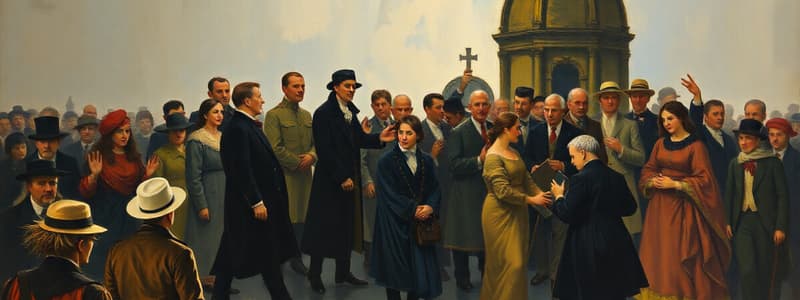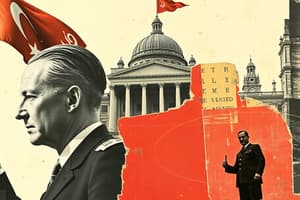Podcast
Questions and Answers
What might John Gaventa argue is a key issue in studying power regarding coal miners?
What might John Gaventa argue is a key issue in studying power regarding coal miners?
- The financial resources of coal mining companies
- The quiescence of coal miners regarding their conditions (correct)
- The need for coal miners to hold regular protests
- The historical background of coal mining labor unions
What did pluralists of the 1960s refer to as the problem of 'nonissues'?
What did pluralists of the 1960s refer to as the problem of 'nonissues'?
- Biased research stemming from unexamined value assumptions (correct)
- The lack of political representation for various groups
- The focus on economic factors in political analysis
- The emphasis on minor concerns over major issues
In the context of political science, how did Dahl's work relate to Mills' power-elite theory?
In the context of political science, how did Dahl's work relate to Mills' power-elite theory?
- Dahl refuted the underpinnings of Mills' theory (correct)
- Dahl expanded on Mills' power-elite concept
- Dahl agreed with Mills about the concentration of power
- Dahl supported Mills' theory wholeheartedly
What aspect did critics of Dahl's pluralism retain as a theoretical template?
What aspect did critics of Dahl's pluralism retain as a theoretical template?
Which of the following did not define the critics of Dahl’s pluralism?
Which of the following did not define the critics of Dahl’s pluralism?
What issue does Gaventa highlight regarding coal miners’ actions?
What issue does Gaventa highlight regarding coal miners’ actions?
What is one outcome of specifying a list of nonissues according to pluralists?
What is one outcome of specifying a list of nonissues according to pluralists?
Who among the following is associated with the criticism of Mills' power-elite theory?
Who among the following is associated with the criticism of Mills' power-elite theory?
What was the time period during which neopluralist observations primarily emerged?
What was the time period during which neopluralist observations primarily emerged?
Which theory did McCarthy & Zald develop from their observations on lobbying organizations?
Which theory did McCarthy & Zald develop from their observations on lobbying organizations?
Which issue area was specifically studied concerning environmentalist groups' effects on public policy?
Which issue area was specifically studied concerning environmentalist groups' effects on public policy?
Which author is NOT mentioned in the context of studies on public interest lobbies?
Which author is NOT mentioned in the context of studies on public interest lobbies?
What issue did the studies by Jones (1975) and others focus on?
What issue did the studies by Jones (1975) and others focus on?
What main phenomenon did neopluralist observations respond to?
What main phenomenon did neopluralist observations respond to?
Which factor is cited as significant in enabling collective action according to neopluralist observations?
Which factor is cited as significant in enabling collective action according to neopluralist observations?
Who critiqued Dahl’s political pluralism, leading to the development of neopluralist observations?
Who critiqued Dahl’s political pluralism, leading to the development of neopluralist observations?
What did Kaufman and Sayre observe about power in New York City's policy processes?
What did Kaufman and Sayre observe about power in New York City's policy processes?
What aspect of policy does Lowi argue varies with the type of policy process?
What aspect of policy does Lowi argue varies with the type of policy process?
According to the observations made by the authors, which bodies held semiautonomous power?
According to the observations made by the authors, which bodies held semiautonomous power?
What did the authors use to conduct their research on policy making?
What did the authors use to conduct their research on policy making?
What type of politics did Lowi refer to in relation to federal regulation?
What type of politics did Lowi refer to in relation to federal regulation?
What is the main idea behind the concept of islands of power mentioned by Kaufman and Sayre?
What is the main idea behind the concept of islands of power mentioned by Kaufman and Sayre?
In which type of policy areas did Lowi suggest pluralism might be descriptive?
In which type of policy areas did Lowi suggest pluralism might be descriptive?
Which researcher is noted for arguing the variability of pluralism-elitism in policy processes?
Which researcher is noted for arguing the variability of pluralism-elitism in policy processes?
What do interest groups provide to their members to encourage participation?
What do interest groups provide to their members to encourage participation?
According to the logic of collective action, what characteristic do small groups of producers typically demonstrate?
According to the logic of collective action, what characteristic do small groups of producers typically demonstrate?
What outcome does collective action theory suggest regarding the interaction between small and large groups?
What outcome does collective action theory suggest regarding the interaction between small and large groups?
What framework has been used to explain social movements alongside collective action theory?
What framework has been used to explain social movements alongside collective action theory?
What is one example of policy areas where the dynamics of collective action are evident?
What is one example of policy areas where the dynamics of collective action are evident?
How does collective action theory explain the challenges faced by numerous constituents?
How does collective action theory explain the challenges faced by numerous constituents?
What concept did Hugh Heclo contribute to the understanding of interest groups?
What concept did Hugh Heclo contribute to the understanding of interest groups?
According to Heclo, which of the following accurately describes the subgovernments in the context of interest groups?
According to Heclo, which of the following accurately describes the subgovernments in the context of interest groups?
What factor can lead to the dominance of small elite groups in policy decisions?
What factor can lead to the dominance of small elite groups in policy decisions?
Which of the following is a common theme among writers discussing social movements?
Which of the following is a common theme among writers discussing social movements?
What role does local farm elites play in agricultural policy according to collective action theory?
What role does local farm elites play in agricultural policy according to collective action theory?
What is the term used for the complex network of communication within an issue domain as per Heclo's theory?
What is the term used for the complex network of communication within an issue domain as per Heclo's theory?
What type of coalitions do beneficiaries of public works construction typically form?
What type of coalitions do beneficiaries of public works construction typically form?
How do the limited coalitions described by multiple-elite writers relate to issue networks?
How do the limited coalitions described by multiple-elite writers relate to issue networks?
What criticism did scholars present against Olson's collective action theory when explaining social movements?
What criticism did scholars present against Olson's collective action theory when explaining social movements?
Which theory emphasizes variables outside of Olson's rational choice framework in analyzing social movements?
Which theory emphasizes variables outside of Olson's rational choice framework in analyzing social movements?
Flashcards are hidden until you start studying
Study Notes
Power and Quiescence
- John Gaventa argues that the inaction of poor coal miners concerning their working and living conditions is a significant aspect of power dynamics.
- This concept is related to the "problem of nonissues," which was identified by pluralists in the 1960s.
- Pluralists argued that defining "nonissues" could lead to biased research due to inherent value judgments.
Pluralism and Political Power
- Robert Dahl's "Who Governs?" refutes C. Wright Mills' power-elite theory and presents the pluralist perspective on political power.
- The pluralist theory is characterized by four key concepts:
- "Nonissues"
- "Special Interests"
- "Multiple Elites"
- "Subgovernments"
- These concepts continue to be influential in subsequent critiques of Dahl's pluralism, influencing "neopluralist" thought.
Power Dynamics in Policy Making
- Herbert Kaufman and Wallace Sayre, along with Theodore Lowi, studied policy making in New York City and found instances of "islands of power."
- These "islands" refer to semi-autonomous bodies like the Board of Education and the Port Authority, which held significant influence within their respective issue areas.
- In a seminal article, Lowi argued that pluralism and elitism vary depending on the specific policy area.
- Regulation-focused areas, such as labor conditions, tend to exhibit a more pluralist dynamic with competing business and labor groups.
Collective Action Theory
- Mancur Olson’s "Logic of Collective Action" addresses the difficulty of collective action, especially in cases involving public goods, where individuals can benefit without contributing.
- The theory predicts that lobbies representing small groups with concentrated interests are more likely to form and exert influence.
- This is due to the relative ease of organizing and the benefits derived from collective action that outweigh the costs for members of smaller groups.
- Larger groups, such as consumers or victims of pollution, face greater hurdles in organizing due to the individual costs associated with participation and the perceived low probability of impact.
Neopluralist Observations
- Neopluralist observations emerged primarily from individual studies of policy making in specific issue areas, frequently employing collective action theory.
- These studies emerged between 1975 and 1985, serving as a response to the research framework set forth by Dahl's political pluralism and its critiques.
- Research on air pollution by scholars like Jones, Ornstein & Elder, Ackerman & Hassler, and Wenner found that environmentalist groups have significant influence on public policy.
- Authors like Berry, McFarland, Mitchell, Nadel, and Vogel documented the substantial strength of public interest lobbies.
- Other studies by Freeman, Costain & Costain, Klein, Gelb & Palley highlight the impact of women's lobbies.
Resource Mobilization Theory
- McCarthy and Zald drew on these observations to develop the resource mobilization theory of social movements, which recognizes the role of lobbying organizations in social movements.
- Although there have been efforts to explain social movements through a rational choice lens, most writers recognize the multifaceted nature of social movements.
Issue Networks and Policy Networks
- Hugh Heclo's concept of "issue networks" provides an alternative perspective to "multiple-elite" theory, arguing that rather than isolated subgovernments, there are intricate networks of communication and interaction within particular issue domains.
- These networks, known as "issue networks" or "policy networks," involve a broader range of actors, including government agencies, interest groups, academics, and the media, that collaborate and influence policy development.
- Heclo posits that the "subgovernments" of multiple-elite theory are less common and are often checked by other actors within the broader issue network.
Studying That Suits You
Use AI to generate personalized quizzes and flashcards to suit your learning preferences.



